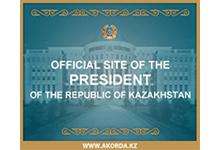Thu, 03/01/2018 - 16:23
The Seventh International Scientific and Practical Conference called: "Implementation of constitutional novels is the guarantee of an effective model of court procedure" began today. The event takes place on 1-2 March this year in the "Ak-Bulak" hotel.
The Forum is organized by the Constitutional Council, the Supreme Court, the General Prosecutor's Office together with the Foundation of the First President of the Republic of Kazakhstan-Elbasy, the Venice Commission of the Council of Europe, the OSCE Office of Programs in Astana, the German Foundation for International Legal Cooperation.
The conference was attended by the Chairman of the Constitutional Council Kairat Mami, Deputy Head of the Presidential Administration Talgat Donakov, General Prosecutor Kairat Kozhamzharov. Also by the head of the supervisory judicial board on cases of the Supreme Court of Kazakhstan Abai Rakhmetulin, Deputy Chairman of the National Security Committee Marat Kolkobaev, Deputy Minister of Internal Affairs Rashid Zhakupov, Deputy Chairman of Agency for Public Service Affairs and Anti-Corruption Aigul Shaimova and Deputy Executive Director of the Foundation of the First President of the Republic of Kazakhstan Igor Rogov. The deputies of the Parliament, judges of the Supreme Court, members of the Constitutional Council, chairmen and judges of local courts representatives of interested state bodies, NGOs, advocates, national and foreign experts attended the Forum.
The conference consisted of three sessions. Within the framework of the first session, a speech was delivered by the judge of the Supreme Court Yerbol Rakhimbekov on the subject of: "Judicial control, development stages: authorization of secret investigative actions". He emphasized that the stages of consistent development of judicial control at the pre-trial stage can be traced by making an analysis of the criminal procedure legislation. The Criminal Procedure Code of 2015 significantly expanded the judicial control, giving official status to the investigating judge. The next step in the expansion of judicial control is the norms of the Criminal Procedure Code, which come into force on March 1, 2018.
"These norms have introduced a new provision that strengthens judicial control, which empowers the investigative judge with powers to authorize actions including secret investigative ones within the Criminal Procedure Code," E. Rakhimbekov said. A special new norm is the possibility of applying a person to the court with a request to recognize the conduct of these actions as illegal and to compensate for the damage caused (if there is any).
Within the framework of the first session, the speakers spoke about the development of juvenile justice, the further improvement of the criminal procedural legislation in the Republic of Kazakhstan, the modernization of the judicial process and the judicial system of the country as conditions for economic growth, the current criminal procedure legislation and certain issues of its reform, and protection of constitutional rights.
The moderator of the second session was Abai Rahmetulin, the head of the supervisory judicial board on cases of the Supreme Court. Speaking about the relevance of the issues under discussion, he noted that there have been significant changes in the judicial system and legal proceedings over the past 10-15 years, but further reforms are necessary in the system of law enforcement bodies. He urged to change and depart from previous approaches. "We all need to move away from assessing the performance of an organ based on percentages. It is necessary to pay more attention to the content part. There must be an in-depth analysis for each indicator," he said.
The head of the supervisory judicial board on cases of the Supreme Court stressed that in a number of states, not materials of the case, but an indictment are presented to the court. Evidence by the prosecution and defense party is submitted to the court when the case is examined. "This is a direction requiring further study. It is possible to proceed step by step to this form in cases of small and medium gravity, "A. Rakhmetulin emphasized.
Within the framework of this session, the representatives of interested bodies spoke about the current trends in pre-trial criminal proceedings, new approaches to criminal prosecution in pre-trial proceedings, the legal possibilities of the lawyer and legal guarantees of the principle of privacy, as well as the main problems of implementing the norms of the Constitution in court procedures of the republic.
The foreign participants took part in it. In particular, Peter Bertelsmeier, the retired chief prosecutor of the General Prosecutor's Office of Frankfurt am Main told about the criminal prosecution of Germany's prosecution office. Ingrid Haussman the judge of the Supreme land court of Munich has informed on powers of the German court in pre-trial procedure.
During the third session, speeches were given on the following subjects: "The Role of the Prosecutor's Office in the German Criminal Process", "The Role of the Prosecutor's Office of Kazakhstan in the Criminal Process in terms of the Constitutional Reform", "Advocate and Prosecutor - Status Change in the Modernization of Criminal Proceedings", "Simplified Court Proceedings in Germany ","Current problems of the current criminal procedural legislation ".
A constructive dialogue and exchange of views took place on all issues outlined in the program during the conference.

















